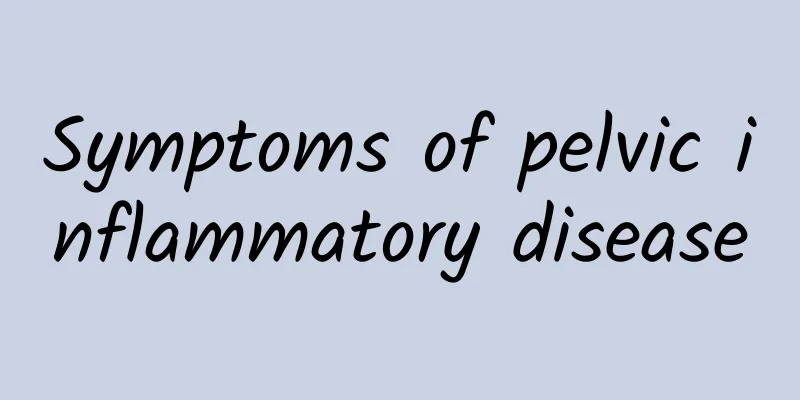Symptoms of pelvic inflammatory disease

|
Pelvic inflammatory disease is a common gynecological disease among most female friends. It is clinically divided into acute pelvic inflammatory disease and chronic pelvic inflammatory disease. If not treated in time, it will not only bring certain troubles to female friends' lives and work, but also have a certain impact on female friends' fertility. Therefore, it is important to understand the comprehensive symptoms of pelvic inflammatory disease in order to treat it in time. So what are the comprehensive symptoms of pelvic inflammatory disease? There are two types of pelvic inflammatory disease: acute and chronic, so their symptoms may vary. The main symptoms of acute pelvic inflammatory disease are lower abdominal pain, fever, increased vaginal discharge, and persistent abdominal pain that worsens after activity or sexual intercourse. If the condition is severe, there may be chills, high fever, headache, and loss of appetite. Those who develop the disease during menstruation may experience increased menstrual flow and prolonged menstruation. If pelvic inflammatory disease wraps around to form a pelvic abscess, it may cause local compression symptoms. Compression of the bladder may cause frequent urination, painful urination, and difficulty urinating; compression of the rectum may cause rectal symptoms such as tenesmus. Further development of acute pelvic inflammatory disease can cause diffuse peritonitis, sepsis, and septic shock, and severe cases can be life-threatening. Chronic pelvic inflammatory disease is caused by the failure to completely treat acute pelvic inflammatory disease or the poor physical condition of the patient, which leads to a prolonged course of the disease. The main symptoms are swelling and pain in the lower abdomen and soreness in the lower back, which often worsens after fatigue, sexual intercourse, and before and after menstruation. The second is abnormal menstruation and irregular menstruation. Some women may experience neurasthenia symptoms such as lack of energy, general discomfort, and insomnia after a long course of the disease. After understanding the comprehensive symptoms of pelvic inflammatory disease, we should treat it in time to avoid delaying the best treatment period of the disease. The treatment of pelvic inflammatory disease requires targeted treatment. First, we need to identify the pathogenic bacteria of pelvic inflammatory disease, which should be checked through special tests, and then symptomatic medication should be used. |
<<: Will cervical precancerous lesions recur after surgery?
>>: What are the treatments for cervicitis?
Recommend
What to eat for irregular menstruation? Teach you seven dietary therapies to easily treat irregular menstruation
Menstruation has been a "good friend" o...
How to eat after pregnancy with uterine fibroids
If you are diagnosed with uterine fibroids during...
How long can patients with cervical warts live?
Life span is a matter of luck and misfortune. You...
Analyze some early symptoms of pelvic inflammatory disease
Pelvic inflammatory disease is a common gynecolog...
Main nursing issues for cervical precancerous lesions
Although milder cervical precancerous lesions are...
What medicine is good for vaginitis
What medicine is good for vaginitis? Clinically, ...
Common manifestations of harm caused by uterine fibroids
The high incidence of uterine fibroids is very co...
Laziness is worse than being fat! Walking for 20 minutes can help you live longer
After seeing the following news, the otakus and h...
How to use medicine for irregular menstruation? 8 dietary taboos for irregular menstruation
What medicine is effective for irregular menstrua...
Does chronic pelvic inflammatory disease cause low back pain?
Does chronic pelvic inflammatory disease cause lo...
Is it serious to have bleeding during intercourse one month after abortion?
Artificial abortion is abortion. Bleeding during ...
Middle-aged women should pay more attention to hyperplastic vulvar leukoplakia!
Middle-aged women should pay more attention to hy...
Diet for patients with hyperprolactinemia
What are the daily dietary principles for patient...
Two methods of treating vulvar leukoplakia
The method of treating vulvar leukoplakia is a to...
How can women self-diagnose severe cervical erosion? Four major symptoms of severe cervical erosion
In life, cervical erosion, a common gynecological...









